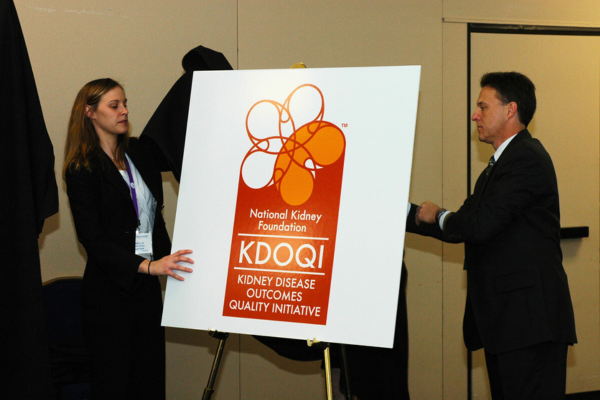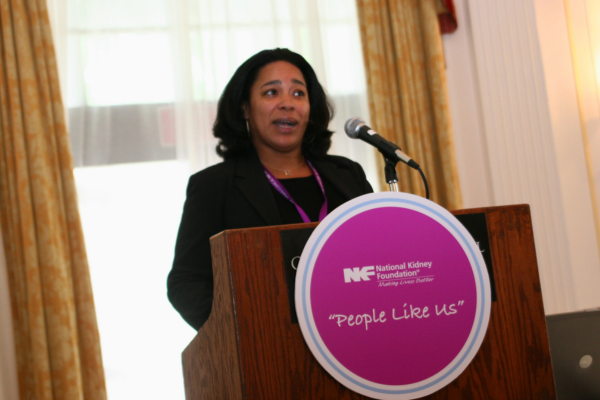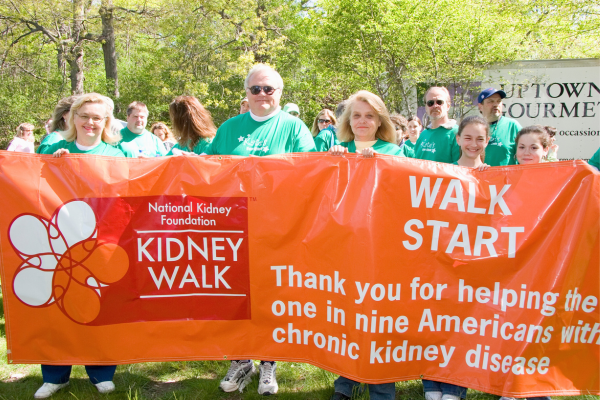July 31, 2025
Free kidney screenings, improved Medicare coverage, and policy wins defined kidney care in the 2000s. Read what changed and why it matters.
“How NKF Got Here" is a series highlighting NKF’s most significant achievements over the decades. Explore the full collection of articles here.
Remember flip phones, MySpace, and the first iPods? The 2000s brought big changes to the world of technology. They also brought progress in kidney health. From free screenings to transplant breakthroughs, here's how the National Kidney Foundation (NKF) and the broader kidney community helped shape a healthier future.
Kidney Care Milestones in the 2000s

- 2000: NKF kicked off the Kidney Early Evaluation Program (KEEP), offering free screenings to people at risk for kidney disease. Risk factors include high blood pressure, diabetes, or a family history of kidney problems. Are you at risk? Take our one-minute quiz and find out!
- 2000: Congress creates the Medicare Nutrition Therapy benefit as part of the Medicare, Medicaid, and SCHIP Benefits Improvement and Protection Act (BIPA) to provide Medicare reimbursement of nutritional counseling services by a dietitian or nutritional professional for patients with diabetes, late-stage kidney disease, or a functioning kidney transplant (maximum six months post-transplant).
- 2001: The 36-month post-transplant limit for Medicare coverage of immunosuppressive drugs for kidney recipients over age 65 was removed.
- 2001: For the first time, more people donated a kidney while alive than after death.
- 2002: The KDIGO guidelines (short for Kidney Disease: Improving Global Outcomes) were released, helping doctors worldwide follow evidence-based care for kidney health.

- 2002: NKF engaged Representatives Jim McDermott (D-WA) and Mark Kirk (R-IL) to establish the Congressional Kidney Caucus, a bipartisan group to raise awareness about and build support for kidney disease policy initiatives
- 2002: NKF helped stop a legislative proposal that would've paid people to donate organs, keeping donation safe and ethical.
Help us unravel the silent threat and rewrite the future of kidney health.
- Equip patients and families with knowledge, resources, and access to high-quality care.
- Advocate for policies that address disparities and prioritize kidney health for all.
- Fund research and technology to advance early detection, improve treatment, and expand transplant access.
- 2003: NKF launched the Kidney Learning System (now called Kidney Learning Solutions), a go-to source for reliable kidney health information for patients, families, and healthcare professionals.
- 2004: Congress passed the Organ Donation and Recovery Improvement Act (Public Law 108-216). This provision, initiated and championed by NKF, made it easier to become a living donor by reimbursing travel and other donation-related expenses.
- 2005: The NKF launched its official patient advocacy group, now known as Voices for Kidney Health, to enable patients to share their stories and help shape policy.

- 2005: The U.S. celebrated its first World Kidney Day, with NKF leading the way!
- 2006: Congress approved funding for the CDC's Chronic Kidney Disease (CKD) Initiative, a major step toward better kidney health nationwide.
- 2007: NKF launched our Take Action Network, making it easier than ever for advocates to connect with lawmakers and push for kidney-friendly policies.
- 2007: KEEP reached its 100,000th screening, helping thousands catch kidney disease early.
- 2007: NKF collaborated with partners to pass legislation to clarify that paired kidney donations and donor chains do not violate the National Organ Transplant Act (NOTA), enabling more people to donate and receive kidneys.
Subscribe today!
Join the NKF Blog Newsletter
Get inspirational stories and kidney disease resources delivered to your inbox every month. You'll gain practical insights and expert advice to help you better understand and manage your kidney health, no matter where you are on your kidney journey.
- 2008: After floods devastated parts of the U.S., NKF provided emergency financial support to help dialysis patients get treatment and rebuild.
- 2008: NKF created the Council of Advanced Practitioners to support the healthcare practitioners who care for people with kidney disease.
- 2008: Scientists achieved breakthroughs in xenotransplantation by engineering pigs without the alpha-gal gene, which triggers a severe immune response in humans. This was a key step toward making pig-to-human kidney transplants possible in the future.
- 2008: Congress passes the Medicare Improvements for Patients and Providers Act (MIPPA), which included the creation of a Medicare Kidney Disease Education benefit championed by NKF to provide comprehensive information about kidney disease treatment options, including types of dialysis and information on organ donation and transplantation.
- 2009: The American Diabetes Association gave KEEP a big shout-out, calling it a "Promising Practice" for reaching at-risk communities of color.
- 2009: During the recession, NKF provided over $4 million in direct aid to kidney patients and their families.
- 2009: NKF introduced our online "Ask the Doctor" forum with Dr. Leslie Spry, allowing people to access trusted medical answers anytime.
- 2010: KEEP hit 200,000 screenings, doubling its reach in just a few years.
- 2010: NKF joined the National Salt Reduction Initiative, teaming up with over 45 groups to cut sodium in the food supply and protect heart and kidney health.


















